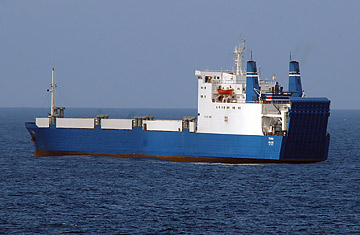
The Ukrainian tanker MV Faina
The Belize-flagged Ukrainian shipping vessel MV Faina will finally deliver its consignment of Russian tanks, grenade launchers and other small arms to the Kenyan port of Mombassa in the next few days, four months late. The ship's captain is dead. Its crew must be desperate to get ashore after weeks as captives of Somali pirates. And the ship's owners have just paid a record $3.2 million to free their vessel and crew.
But is the saga really done? Questions about the tanks' ownership arose shortly after the pirates seized the Faina on Sept. 25. The BBC published a document that it claimed was the Faina's freight manifest. The contract number on the manifest includes the initials "MOD/GOSS" — initials which some experts claimed stand for Ministry of Defense/Government of South Sudan. (See pictures of Somalia's face of modern piracy.)
The Kenyan government says that's rubbish. According to the Ministry of Foreign Affairs, GOSS stands for "General Ordinance and Security Supplies," a division of the Kenyan Defense Ministry. "This is the thing with these sort of acronyms — they could mean anything. It's perfectly plausible, and it's up to everybody else to prove otherwise," says Paul Holtom, a researcher with the Stockholm International Peace Research Institute's Arms Transfers Project. "My point is that that manifest doesn't support definitively one or the other except to say that the consignee is the Ministry of Defense in Kenya."
The Ukrainian government has repeatedly said that the arms are bound for Kenya. Mykola Malomuzh, the chief of Ukraine's state weapons-exporting agency, Ukrspetsexport, said Kenya had assured the government that it and not South Sudan was the owner of the tanks. "The cargo onboard the ship was transported under a contract between Ukrspetsexport and the Defense Ministry of Kenya," Malomuzh said Thursday.
All this matters because of the situation in Sudan. The country's Khartoum-based government suspects the government of South Sudan of rearming ahead of a 2011 referendum in which southerners will decide whether to break away and form a separate nation. Some analysts have suggested that the tanks could be part of a new, more robust southern Sudanese ground force. Conflict between Sudan's north and south in the 1980s and '90s killed more than 2 million people. A peace deal in 2005 ended hostilities but opened the way for an independent South Sudan, a possibility Khartoum is determined to halt. (See pictures of the brazen pirates of Somalia.)
The Sudan People's Liberation Movement, which controls the government in the south, has distanced itself from the suggestion that the tanks were bound for them. "The SPLA [Sudan People's Liberation Army] can buy arms anywhere in the world legally. It doesn't have to do it illegally," said John Andruga Duku, South Sudan's ambassador to Kenya.
Duku will not say if Sudan is rearming. "Constitutionally, the government of South Sudan is not under any restraint against buying arms anywhere in the world," he said.
In any event, it's likely that the tanks will stay in Kenya. "There has been a lot of controversy on where the military tanks were destined," committee chairman Adan Keynan said Friday. "To ensure accountability to the Kenyan people, the Ministry of State for Defense should ensure that the clearing process is open and transparent. Kenyans want to know the end user of the cargo."
Even so, Kenya has repeatedly filed papers with the U.N. reporting no imports or exports of tanks — a claim contradicted not only by the Faina's cargo but also by a 2007 filing in which Ukraine said it was shipping 77 battle tanks to Kenya.
On Friday, the U.S. Navy's Bahrain-based 5th Fleet, which has deployed ships along the Somali coast to try to clamp down on piracy, said teams had boarded the Faina to provide food and medical help to the 20 crewmen on board. The captain died of a heart attack soon after the capture. "The U.S. Navy has remained within visual range of the ship and maintained a 24-hour, 7-days-a-week presence since it was captured," the 5th Fleet said.
Perhaps inadvertently, that statement said much about the reasons piracy remains such a problem off Somalia: The 20-odd warships from more than a dozen nations patrolling those waters have largely held off from attacking pirates or trying to free ships. The pirates, in fact, went unhindered the day they left the Faina, and there has apparently been no effort to capture them.
